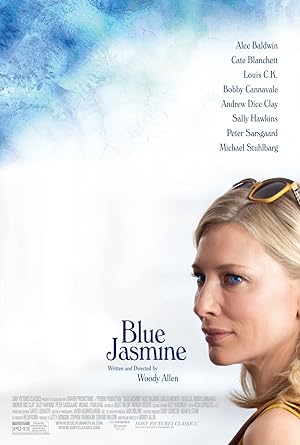Blue Jasmine is one of Woody Allen’s best films because of the cast, its relevance to our current economic climate and its revealing exploration of multiple themes. While most of Allen’s films have morally questionable and neurotic characters, Blue Jasmine may feature one of the few broken ones, and everything is certainly not happily ever after by the end, superficially or spiritually, whereas most of his main characters achieve success while being emotionally dissatisfied.
Blue Jasmine is basically the Bernie Madoff story from the wife’s point of view. There are parallel story lines: the past and the present. Cate Blanchett plays Jasmine, who is indeed blue because she has lost her money, sanity and standing and gained the derision that would have been directed at her husband if he was more accessible. There is a question of whether or not she was complicit, willfully ignorant or a fellow victim of her husband’s schemes. She retreats to her sister’s home on the West Coast to get a new start. They were both adopted and have almost nothing in common except their parents and their dependence on a man as an anchor in their life. While her sister, Ginger, played by one of my favorite actors, Sally Hawkins, is more functional because she is a mother, has a home and a job and is easier to satisfy, she is easily influenced by anyone in her proximity and unlike most of Allen’s other women characters, including the ones in romantic relationships, seems to have no independent life outside of her love interest.
I watch a lot of movies, but this year, I finally saw Lars von Trier’s Melancholia and a ton of Pedro Almodovar films. Almodovar and even Von Trier, who is not known as being gentle in his treatment of his female creations, depict and can conceive a sororal bond and comfort, which is starkly absent and ultimately destroyed in Blue Jasmine. I don’t think that Allen realized how much he was actually revealing about his attitude towards women when he made this film. Blue Jasmine’s narrative structure provides the audience with an opportunity to compare and contrast the sisters by showing how Jasmine and Ginger provide hospitality for the other. Ginger is clearly the better woman-she does not have much, but she is generous in spirit and shares what she has. Jasmine had plenty of time and resources, but did as little as possible, which only seemed generous. Jasmine ultimately disdains her sister’s working class ethos and willfully cultivates an aristocratic one. Jasmine is a whited sepulchre. Ginger’s proximity to Jasmine is seen as an infection of dissatisfaction. If the sisters bond, Ginger will be spiritually obliterated.
For me, what fascinated me about Jasmine is how quickly most people who did not know her, but actually listened to her, picked up on her insanity quicker than the people who knew her and assumed that her superficial camaraderie was real. Only people who were sexually attracted to her or relied on their family relationship to her were fooled. While Jasmine appears to dress and speak well, she is actually like the madman on the corner who is having an animated with no one. For all of her attempts at reinvention, Jasmine is unable to internally escape her past. She is constantly reliving, as depicted in the scenes set in the past, her glory days and not actually interacting with the person beside her. Allen repeatedly shows strangers, who initially seem like close friends, trying to escape her ranting. Side note: this is my nightmare! I often talk too much and am concerned that I’m actually Jasmining everyone so instead of inflicting my torrent of words on others, I try to wait for an invitation instead of initiating contact.
For Allen, what makes Jasmine worst than his murderous main characters in Crimes and Misdemeanors and Match Point who escape punishment and condemnation?
S
P
O
I
L
E
R
S
Jasmine is a snitch and momentarily prefers revenge to getting away with it and living the best available life. The rumors that she was also modeled on his ex-wife, Mia Farrow, seem unfounded except for this central point. In Blue Jasmine, the worst person is not the sexual harassing dentist (that is a comedic moment), the emotionally volatile and potentially abusive boyfriend (that is a sign of real love) or the repeat philanderer and scammer. The worst person is the woman who can’t accept that she is being turned in for a new model, won’t quietly accept her consolation prize and gets revenge by telling about a man’s bad acts. It makes sense that a man accused of child abuse would create a villain out of a woman who tells. Unlike his other films where the morality of the bad act is debated, and the act is still evil, but there are no consequences or God, Allen is God, and he gives every single character an opportunity to castigate Jasmine. It is a fact of great cultural significance that the mortal blow is delivered by Andrew Dice Clay, “Some people they don’t put things behind them so easily.” Jasmine is awful, but is she the worst? To Allen, the answer is clearly in the affirmative.
Stay In The Know
Join my mailing list to get updates about recent reviews, upcoming speaking engagements, and film news.





